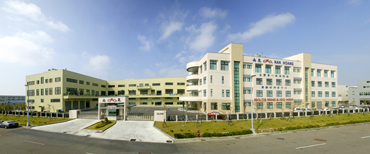Taiwan's Leading Friction-Material Maker Does Not Brake on Safety
2009/04/07 | By Quincy Liang | NAN HOANG TRAFFIC INSTRUMENT CO., LTD.
Brake parts are critical to the safety of almost all vehicles and their riders, and makers of such products have a heavy responsibility to make sure that their products are up to par.
This sense of responsibility is deeply ingrained in the mind of Fred Cheng, president of the Nan Hoang Traffic Instrument Co. (NHC), Taiwan's largest maker of friction materials and parts. He feels responsible to his customers and end-users all over the world; to his father, who founded the company in 1961 (the younger Cheng took it over 37 years ago, at the age of 22); to the 200 or so workers in the three NHC factories; to his religion; for the constant development of newer and better products; for uncompromising product quality and durability.
NHC was the first friction-material maker in Taiwan, and also the first to succeed in the 100% development of its product formulas in-house instead of relying on partnership with foreign technical partners as other companies did. And the company was one of the first in Taiwan to pass the stringent requirements for ISO/TS16949 certification.
In 2005, NHC became the first local company to set up a world-class friction-material R&D center. Since that time, the center has developed more than 50 new material formulas.
The company's product catalog currently contains over 6,000 items, including brake linings, shoes, and pads, and clutch plates for cars, motorcycles, agricultural machines, and other types of machinery. The size of the catalog is growing by more than 200 items per year.
To meet the burgeoning demand from customers all over the world, and especially from an increasing number of international manufacturers of automobiles, motorcycles, and bicycles, as well as from tier-one parts suppliers, NHC set up its third Taiwan plant in 2007-the first such on the island with fully automated mixing and feeding equipment as well as production lines.
"NHC planned for the new plant for about 10 years," Cheng reported, "and during that time our capacity fell short of demand." The new facility should take care of that problem in style, with all the latest equipment and full air conditioning.
Taiwan's lack of sophisticated testing and inspection equipment in the early years forced the company to sell friction parts mainly to the aftermarket. Now, it has the world-class facilities it needs to prove the superior quality of its products and is a 100% qualified supplier of original equipment (OE) parts. "Lots of international vehicle and first-tier parts makers have surveyed our facilities and given them the highest approval," Cheng says. "We're ready to take off."
Core Competitiveness
NHC's strength comes mainly from its R&D capability, which allows the company to develop all its key manufacturing equipment and friction materials in-house. (Over the past four years, the center's researchers have developed more than 80 non-asbestos materials that can be used in a wide variety of friction parts for vehicles and machines.) Because of this, it has no real rivals any more because other companies are not able to develop their own formulas and production equipment.
The company's R&D personnel have been on the job for an average of over 20 years and, Cheng says, all of them have won the highest-level licenses. Each has his own area of specialization, and together they are able to develop both the hardware and software needed for special-purpose production machinery and friction products.
In addition, the R&D center can carry out all the physical and performance tests in labs certified under the most stringent American and European standards, such as ISO-ICE 1725.
Each order received by the company is filled in accordance with the buyer's technical specifications, and all of the necessary production equipment, dies, molds, jugs, and fixtures are developed quickly. Every step of the production and delivery process, from materials procurement to manufacturing, packaging, and shipping, is strictly scrutinized by the NHC's quality-control division.
Quality First
"Quality is second nature for every employee of NHC," Cheng states. "We know that every one of our products affects the safety of users' lives, so we strictly follow the requirements of major international standards-in fact, we do better than we have to. From the very first, NHC has been a customer-oriented company."
The company turns out a wide range of products and friction materials, including non-asbestos organic (NAO), low-metallic (LM), semi-metallic (SM), fully metallic (FM, materials such as sintered bronze, sintered steel, and sintered carbon steel), ceramic fiber, titanate reinforced fiber, cork, friction paper, carbon, and semi-hard and semi-soft.
Brake shoes and pads made of NAO material currently account for about 90% of the company's production, and an aggressive product diversification program is targeting products for such uses as racing vehicles, special-purpose vehicles, and wind generators.

